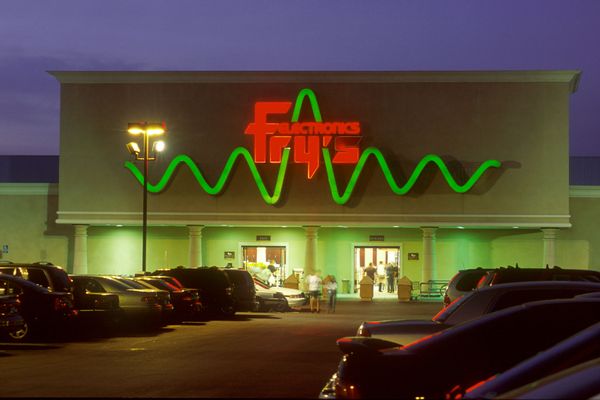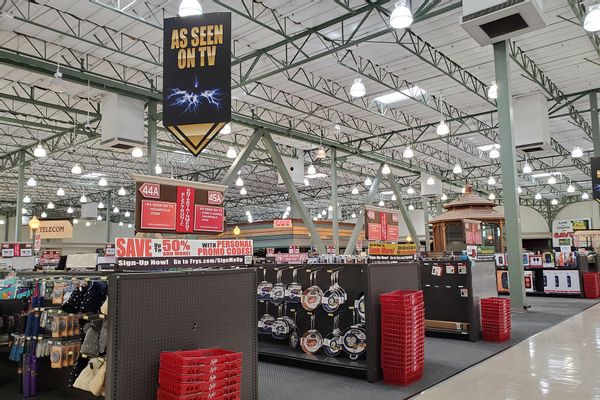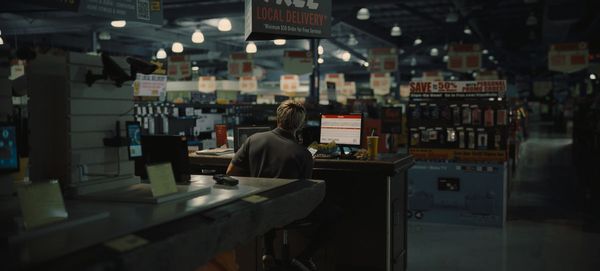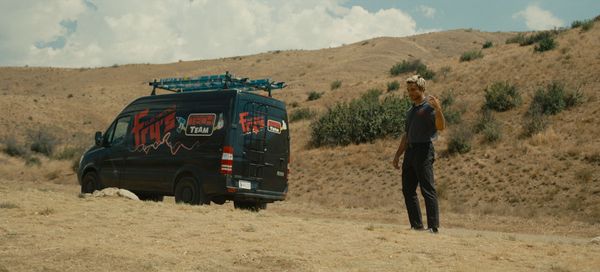
For many audience members watching "Nope," a certain UFO sighting may have struck a nerve – evoking both joy and wistful nostalgia.
No, it's not the resurfaced memory of a past alien abduction. Rather, it's director Jordan Peele's use of the real-life Fry's Electronics, featuring a giant sculpture of a flying saucer that had "crashed-landed" into its storefront. A favorite with locals, the iconic Burbank, California big box store gives Peele's movie a quirky specificity while also grounding its fantastical story in the real world.
"We wanted Fry's for several reasons: obviously, the spectacle that Fry's is ... It's iconic, and that intrigued Jordan."
In "Nope," siblings OJ and Emerald Haywood (Daniel Kaluuya and Keke Palmer) suspect UFO activity out by their horse ranch. In order to capture evidence for that "Oprah shot," the two head over to Fry's Electronics to buy surveillance equipment. Fry's Tech Team member Angel (Brandon Perea) not only helps them install their cameras but eventually gets pulled into their elusive UFO-imaging mission.
Salon spoke to Ruth De Jong, the film's production designer who had worked with Peele previously on "Us" about the challenges of shooting at a store with a reputation that outlived the business itself.
"Previous to a script existing, I started brainstorming with Jordan," said De Jong. "We had a lot of ideas around wanting to ground it in a real place that related to Los Angeles – both [shooting] in Agua Dulce and Santa Clarita – and then wanting to make iconic establishments like Fry's being one of them.
"We wanted Fry's for several reasons: obviously, the spectacle that Fry's is, the experience for the shoppers, all of us who have been in LA forever," she continued. "It's iconic, and that intrigued Jordan because typically it's encouraged that we just create a fictional store to avoid clearances and cost; the cross-branding can be tricky. But we thought, 'Oh my gosh, this is great. It's going to just create so much value to the story. It will make sense in Burbank.'"
I’m sad about Frys closing, but I’m happy for them that they were able to stay open for 25 years since they got ravaged by aliens in the 90s. pic.twitter.com/9aeBPhh7l4
— Alex Pardee (@alexpardee) February 24, 2021
Sadly, by now all Fry's stores have closed permanently, but in 2020, the announcement of the impending closure while "Nope" still intended to shoot there sent the production team into a brief panic. Frantic texting between De Jong, the film's unit production manager and Peele ensued. The film almost backed out entirely on using Fry's, but in the end, the idea of preserving the store on celluloid won out.
"It's been here forever, it will always be a piece of history," said De Jong. "If anything, this movie will be the last known stop for Fry's and really just give it a sweet goodbye. Long story short, we got in touch with Randy Fry, the owner who's based out of San Francisco. His son was managing the Burbank Fry's. They were so gracious and held off the sale of that property to allow us to film."
That history of Fry's Electronics' kitschy decor

Like "Nope's" Haywood Hollywood Horses, Fry's also began as a family business. The first Fry's Electronics opened in Sunnyvale, California on May 17, 1985. This was not your typical electronics store, however. In addition to stocking DIY tech items like integrated circuits, microprocessors and other computer components, the store also peddled video games, eclectic household appliances, toys, pocket knives, porn magazines, sodas and snack foods. One could happily get lost browsing the cluttered aisles in the warehouse-sized building, picking up anything from motherboards to Flamin' Hot Cheetos.

That all began with the second Sunnyvale location, which was designed to look like a giant computer inside and out. The exterior mimicked a DIP integrated circuit, door handles looked like ENTER and ESC keys (clever!), while the interior walls and floor were inspired by circuit components and circuit boards.
Not content with sticking with the electronics theme, the chain then lost its damn mind and adopted imaginative themes in its other stores, often without apparent rhyme or reason. Oh sure, some of the 31 Fry's stores across nine states highlighted history specific to its region, but what's the fun in that? (Although points to the Las Vegas Fry's going meta with its recreation of the Las Vegas Strip.)
Instead, it was an adventure to drop into the Phoenix, Arizona store that paid tribute to an Aztec temple. Or why not swing by the Steampunk Fry's in City of Industry? There were also stores devoted to automobile racing, Chichen Itza, Tahiti, the Roman empire, a cattle ranch and the 1893 World's Fair, just to name a few.
Fry's Electronics @ San Jose, CA (opened March 1996) pic.twitter.com/BqUunMu6WF
— Froyo Tam 📕 (@FroyoTam) February 24, 2021
Chris Nichols, an expert on Southern California architecture, told KPCC's "Take Two" that the bizarre decor mandate was the brainchild of founder John Fry, "this wealthy and exotic personality that wanted to build all of these crazy stores."
And of course, this level of showmanship and craft came courtesy of Tinseltown. Hollywood prop and movie set designer Eric Christensen, who once worked for George Lucas, designed these larger-than-life themes, which could cost upwards of $1.5 million, reports a 2000 Los Angeles Times story.
During the pandemic, Fry's customers had already realized something was amiss when faced with empty shelves in the usually packed aisles. Once the company announced the chain's closing, several shoppers made final visits to their local stores to take advantage of liquidation sales and to take photos and videos of the memorable decor – to record the dream that once was.
One can pass through the looking glass in one YouTube video taken at the Woodland Hills, California Fry's that featured an Alice in Wonderland theme. The floor is a gleaming black-and-white chessboard, while giant playing cards swoop across the ceiling, and red pawns prop up the checkout counter. Throughout are sculptures of the Queen of Hearts, the Caterpillar, Tweedle Dee and Dum, the Jabberwock, Alice and more - all in the style of John Tenniel's original illustrations.
The Burbank location, which opened in 1995, was practically made for "Nope." Not only did the alien invasion theme fit the film's main imagery, but the store's tribute to science fiction films echoed the theme of filmmaking, storytelling . . . and spectacle.
Capturing that Fry's footage
Although "Nope" was able to secure the Burbank location to shoot before everything was taken down, the all-important UFO footage of the storefront came close to not being featured at all. According to De Jong, Peele had played with the idea of swapping out the flying saucer using movie magic.
"We changed the UFO to a 1960s convertible in post[-production]. I created the 1960s Cadillac rear end with the taillights. We went through so many iterations," said De Jong. "I think Jordan didn't want to – just at that moment – be so on-the-nose. But I think ultimately, he just was like, 'Let's make it what it actually is.'"
Sticking with the original alien theme meant that "Nope" could also use the interior sculptures that were based on sci-fi movies like "Godzilla," the robot from "The Day the Earth Stood Still" and giant ants from "THEM."
"They had the giant massive octopus, the UFO on the inside, and the military installation. All of the stuff would riff off of old movies," said De Jong.
While the one-of-a-kind sculptures remained, the store itself had already been closed and emptied, which means that the "Nope" team had to recreate the packed shelves.

"There were specific aisles we needed that needed to have all of that type of electronics surveillance components and stuff," she continued. "We tried to keep it true to how Fry's had it laid out where we had washing machines and refrigerators and dryers. And then we filled the aisles they walked down with some more electronic-based stuff and different weird things like blow-up swimming pools. It was a hodgepodge. It was exactly like Fry's."
Production also had Fry's corporate branding permission to use the logo on everything from signage to name tags. And while that helped add the last touches to the interior of the store, it also lent verisimilitude to "Nope" techie extraordinaire, Angel. Slap the Fry's logo on a black polo shirt? Instant uniform. And then there's his official-looking vehicle for Fry's Tech Team.
"The van we got from Fry's. It was one of theirs and we rewrapped it because it was in bad shape," said De Jong. "We recreated their logo with the electricity because Jordan wanted to just give it a bit more spice and make it a little more exciting. Then we wrapped the whole van and we built out the van with the ladders on top exactly how Angel's character had it. He was the equivalent of the Geek Squad [but] at Fry's. We made all that up."

As for the iconic UFO and other Fry's sculptures, their fates are less certain. A "Save Fry's" campaign attempted to raise money for various members of the public to purchase the sculptures, but it doesn't seem to have had any success. De Jong believes that if Fry didn't liquidate the sculptures, he may have decided to keep them as a collector himself.
"He says a lot of the pieces he and his wife had around their yard or estate up in San Francisco," said De Jong. "I think he was hard-pressed to just let those go. It'll be interesting with the life of this film to see what he ends up doing with all the memorabilia."
The impermanence of Fry's lends extra poignance to its appearance in the film. As one character cryptically observes, "We don't deserve the impossible." Like the Haywoods attempting to capture the fleeting image of the UFO, "Nope" captures some of the magic of what Fry's offered. Belying its Silicon Valley roots, the store also peddled a dream of something decidedly non-technical. Immersed in such fantastical settings, customers attached meaning and memory to their shopping experiences.
"The crew had so many stories of their experience in Fry's. Jordan had so many," said De Jong. "It was such a cool, nerdy, kind of punk [place]. At the end of the day, we were thrilled that we ended up going through with it. It was a nice farewell for Fry's. We got to forever pay homage."
"Nope" is currently in theaters.







